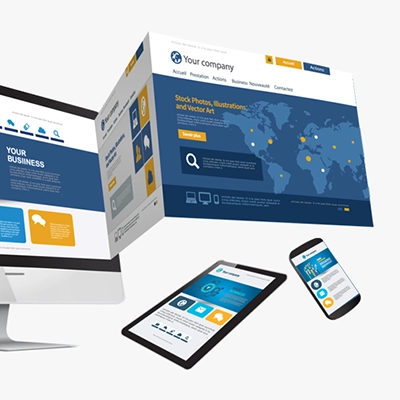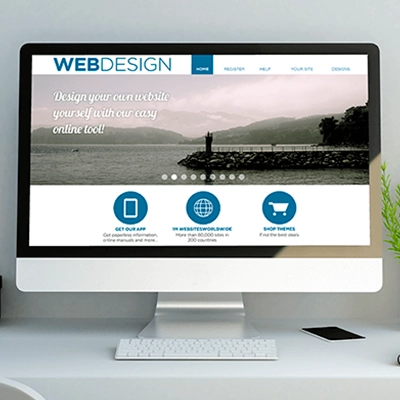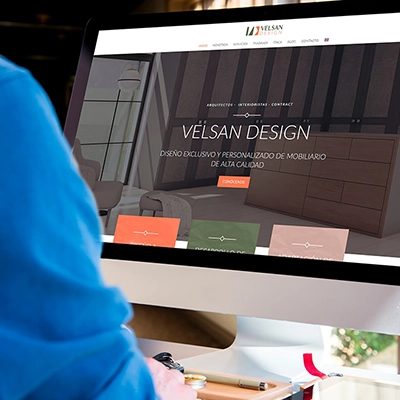Why Your Business Needs a Professional Website
Today, the success of a business depends not only on the quality of the products or services it offers, but also on its ability to adapt to the digital world. A professional website is your business card on the Internet and a strategic tool to attract clients, build trust, and stand out in an increasingly competitive market. It’s not just about having an online presence, but about building a solid digital space that clearly communicates the company’s value proposition and drives growth.
The importance of a professional website in the digital age
Nowadays, consumers research online before making a purchase decision. They compare prices, read reviews, and look for reliable information. In this context, a website is the first point of contact between a company and its potential customer. A poorly maintained website gives the impression of unprofessionalism, while a well-designed site, with structured content and easy navigation, conveys reliability and commitment. For this reason, having a professional website is no longer optional but an essential investment for any organization that wants to grow and establish its position.
A quality website also serves as a direct communication platform with your audience. It allows businesses to explain who they are, what they offer, and how they can solve customer needs. At the same time, it acts as a loyalty channel by keeping users informed about updates, promotions, or services. In a digital environment where competition is constant, standing out through a well-designed website is key to making a difference.

Key benefits of having a well-designed website
Credibility and trust for your clients
A business without a website can be perceived as unprofessional or unreliable. On the other hand, a professional site conveys security and trust. An attractive design, clear information about services, and updated contact details create a positive impression on users. In addition, having privacy policies, security certificates, and testimonial sections strengthens brand credibility. Trust is a decisive factor in the purchasing process, and the website becomes the foundation for building long-term relationships with clients.
24/7 availability and greater reach
One of the greatest advantages of the Internet is that it never sleeps. A professional website allows your business to be available at all times, even outside of business hours. This not only makes it easier for clients to access your products or services whenever they need, but it also expands your brand’s reach globally. For example, an online store can receive orders even while the team is resting, turning the website into an active and profitable sales channel.
Optimization for digital marketing
Digital marketing requires a solid foundation, and that foundation is a professional website. Through an optimized site, businesses can implement SEO strategies, Google Ads campaigns, email marketing, and social media integration. Moreover, a well-built site enables the use of analytics tools that help measure results and adjust strategies in real time — a crucial element to optimize resources and achieve better outcomes. Without a proper website, investments in advertising or positioning are wasted.

Differences between an amateur website and a professional one
It’s common to see businesses creating improvised sites just to “be online,” but these do not meet today’s market standards. An amateur website usually suffers from slow loading times, design flaws, lack of mobile responsiveness, and poor search engine optimization. In contrast, a professional website is built with a strategic approach: optimized speed, intuitive navigation, responsive design, and a structure designed to guide users toward conversion.
The difference also lies in scalability. An amateur site rarely grows in an organized way, while a well-planned website can integrate new functionalities such as e-commerce, online booking, CRM integration, or marketing automation. In this way, it becomes a long-term investment that evolves alongside the company.

How a website drives business strategy
Beyond aesthetics, a professional website becomes a strategic pillar for business growth. It centralizes brand communication, showcases the value proposition, attracts potential clients, and builds long-term relationships. It also serves as a direct channel for implementing content strategies, e-commerce, or personalized online services. In other words, the website works as a tool that operates 24/7 for the company.
A website also allows businesses to collect valuable information about users: from their interests to their browsing habits. This data becomes essential input for creating more effective campaigns and making evidence-based decisions. Without a professional website, this information is lost, and the company’s growth potential is limited.

Essential elements of a professional website
Attractive and functional design
The design of a website should not only focus on visuals but also on the user experience. Clear navigation, intuitive menus, and well-organized content are key. An attractive design makes an impact, but its real value lies in guiding visitors toward important actions: requesting information, signing up, or making a purchase. Additionally, a responsive design ensures the site looks optimal on any device, which is essential in a mobile-first world.
SEO optimization for search engines
A beautiful website is useless if no one can find it. A professional site must be optimized for search engines, which means working on titles, meta descriptions, headings, internal and external links, and having a clear, accessible structure. SEO ensures that your business appears in the top search results, attracting quality organic traffic and increasing conversion opportunities. It also allows smaller businesses to compete fairly with larger ones since positioning depends more on strategy than on company size.
Security and user experience
Security is one of the most important aspects of a professional website. Implementing SSL certificates, protecting contact forms, and keeping systems updated are essential to safeguard both company and user information. Equally important is user experience: fast loading times, responsive design, and simple navigation encourage visitors to stay longer and return. On the other hand, a slow or unsafe site creates distrust and drives potential clients away.

Common mistakes when not having a professional website
Many companies make the mistake of underestimating the importance of a quality website. This can lead to issues such as:
- Losing potential clients due to a lack of clear information.
- Poor search engine ranking because of missing SEO optimization.
- Security problems that damage user trust.
- Poor mobile experience due to lack of responsive design.
- Difficulty measuring results and making strategic decisions.
These mistakes not only harm the brand’s image but also limit its growth in a highly competitive digital environment. While some companies move forward with digital solutions, those that do not invest in a professional website are left behind and lose relevance against their competitors.


 info@digitalnexustec.com
info@digitalnexustec.com +51 979 363 455
+51 979 363 455



